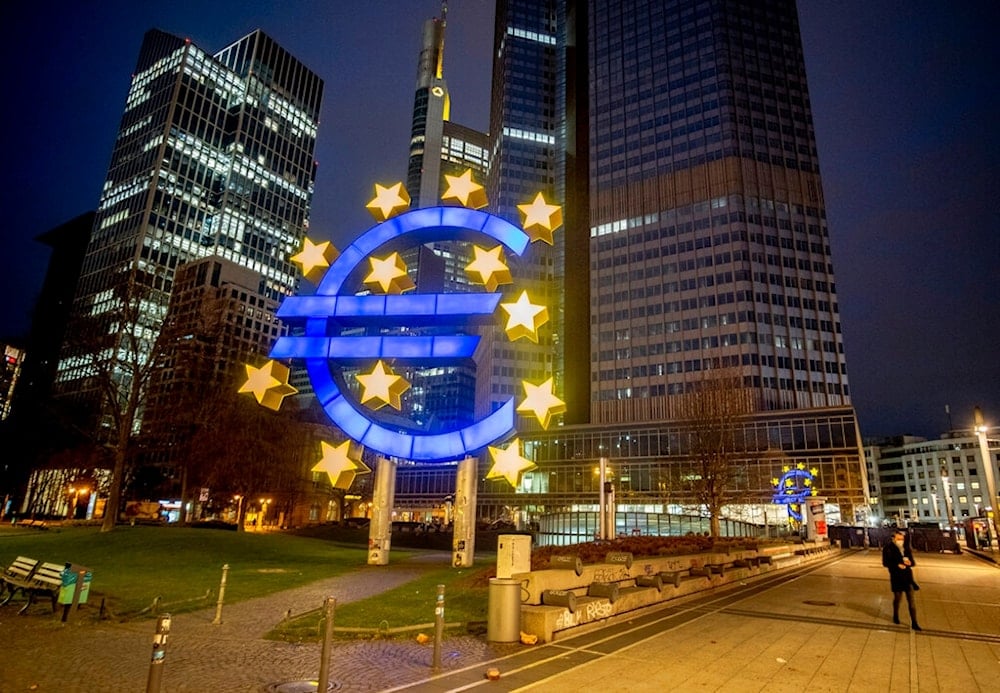ECB pressures Eurozone banks to expedite exit from Russia: FT
The Frankfurt-based regulator has reportedly sent letters to affected lenders, demanding an "action plan" for their Russian business by next month.
-

A man walks past the Euro sculpture in Frankfurt, Germany, March 11, 2021 (AP)
The European Central Bank (ECB) is urging Eurozone banks with ongoing operations in Russia to hasten their withdrawal due to the risk of US sanctions, according to a report by the Financial Times.
The Frankfurt-based regulator has reportedly sent letters to affected lenders, demanding an "action plan" for their Russian business by next month.
Several EU banks, including Austria's Raiffeisen Bank International (RBI), Italy's UniCredit, Dutch lender ING, Germany's Commerzbank and Deutsche Bank, Hungary's OTP Bank, Italy’s Intesa Sanpaolo, and Sweden’s SEB, continue to operate in Russia despite the Western sanctions imposed due to the Ukraine conflict.
Recently, UniCredit and RBI, which have longstanding operations in Russia exceeding 30 years, have come under scrutiny from US financial authorities. These banks reportedly face threats of being severed from the US financial system.
Just last week, RBI abandoned a deal to exchange assets in Russia for ones in the EU. This agreement, which involved the holdings of sanctioned Russian billionaire Oleg Deripaska, was aborted due to pressure from US authorities.
Read more: EU banks can't break up with Russia despite sanctions: Bloomberg
Washington’s intervention has heightened concerns within the EU regulator that Raiffeisen and other banks could become targets for further sanctions, risking substantial damage to the EU's banking sector, according to a source familiar with the ECB's stance.
"The ECB's response to the US interventions shows the big dependency of Europe on the US," an adviser to banks with Russian operations told the Financial Times. "We are more followers than leaders on judgments involving European companies."
The ECB has tailored its communications to each bank, varying in strictness based on how advanced the bank is in its withdrawal from Russia and the extent of its exposure in the country, according to FT sources.
Despite the geopolitical tensions, EU banks have seen substantial profits from their Russian operations. The combined profit for these banks in Russia was over €3 billion ($3.2 billion) last year, a threefold increase from 2021. Consequently, these banks paid approximately €800 million ($857 million) in Russian taxes, up from €200 million in 2021, according to the Financial Times.
Read more: US to threaten Austria with sanctions over economy ties with Russia
In October 2023, the Financial Times reported that Russian authorities had implemented a prohibition on foreign companies withdrawing their profits from the nation in response to sanctions imposed by the West.
Dmitry Peskov, the Kremlin Press Secretary, refrained from directly confirming the report at that time. However, he acknowledged the existence of what he termed a "special regime" for Western companies leaving the country due to pressure from their respective governments, citing the ongoing "quasi-war" waged by the US and EU against Russia.
Following the outbreak of conflict between Moscow and Kiev in 2022, prominent companies such as Apple, IKEA, Microsoft, IBM, Shell, McDonald's, Volkswagen, Porsche, Toyota, and H&M were among the first to cease operations in Russia. Nonetheless, many foreign businesses chose to remain, with some transitioning to Russian ownership or undergoing rebranding.

 3 Min Read
3 Min Read








